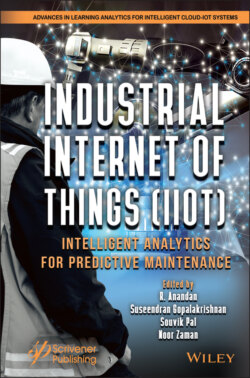Читать книгу Industrial Internet of Things (IIoT) - Группа авторов - Страница 18
1.3.1 Industry 4.0 Concept
ОглавлениеIndustry 4.0 is considered as Fourth Industrial, also characterized by the introduction of information technology in the industry, representing the total transformation of the entire ambit of industrial production through the unity of digital technology and the internet (connection) with conventional industry, deriving from IoT as a connected network, which alone has immense amounts of connections between industrial cells [1].
IoT in Industry 4.0 is basically responsible for the integration of all devices inside and outside the industrial plant, relating the digital transformation and the function of the IIoT, together with developments in mechanics, engineering, and manufacturing [2].
Consider that the IoT is a network of physical objects, platforms, systems, and applications with incorporated technology to communicate, feel, or interact digitally with internal and external environments. The IoT on the shop floor is related to an environment where all equipment and machines are connected in networks and providing information in a unique way; therefore, different industrial cells have different purposes, having different functions and applicabilities, but they are united under the same network. Thus, IIoT is a subcategory of IoT, which also comprises user-oriented applications, such as usable devices, machine devices, and infrastructure with integrated sensors that transmit data (collected information) via the internet and which are managed by software, technology for smart homes, and even cars autonomous [3].
However, this industrial revolution is not yet a reality, even so, it is being motivated by three major changes in the productive industrial world related to the exponential advance of the capacity of computers, the immense amount of digitized information, and also new innovation strategies in relation to research and technology [4].
The connections generated by IoT in the industry generate opportunities create a large circle of added value to products and services as integrated monitoring, generating data that communicate in real time through what can be considered a large unified database or even scheduled maintenance stop on the production line before this is intensified. From this generated database, automatic decisions are made through online communication between interconnected devices correlated to event monitoring. Based on the decisions taken through the global view, the production process becomes more efficient, reducing negative impacts and maximizing the value chain of a given industrial sector [5].
The benefits of IoT in Industry 4.0 for industrial plants can be understood in the following aspects related to operational efficiency and maximizing profits by introducing more flexible automation, connectivity, and production techniques. In addition, scalability, time, and cost savings help to maximize profits for industrial organizations. Pondering about the aspects that increase the operational efficiency of a plant is reducing production stops, reducing the cost of the asset cycle, improving the use of the asset, and even improving the production [46].
Even listing the benefits of new services and business models given that IoT in Industry 4.0 allows the creation of new sources of revenue by creating new connected services. Hybrid business models allow both digital products and services to be used. In an applicable context, a vehicle manufacturer can take advantage of the raw data obtained to provide car condition service in real time as a source for preventive maintenance. This use of digital services also improves the relationship with the customer, since it allows different points of contact that generate valuable information for the customer, creating a relationship of trust and loyalty [47].
Even the benefits related to greater knowledge for decision-making arising from the analysis of industrial data, allowing and facilitating the making of better decisions due to a more accurate view of the industry’s performance. To top it off, IIoT’s network of smart devices allows industrial organizations to connect all of their employees, data, and processes from the shop floor to executives and managers, further assisting the productivity of department leaders and decision-making [48].
It is important to emphasize that more than facilitating decision making, Industry 4.0 aims to promote that these decisions are made automatically by intelligent techniques, toward an autonomous reaction of the machines. From the point of view of systems and equipment, these steps correspond, respectively, to a vision of what is happening (data), to know why it is happening (analysis, knowledge), and to predict what will happen (based on standards and AI). After that, analyze the implementation of a strategic plan, requiring a clear roadmap in relation to the processes, security, and necessary technologies [7].
